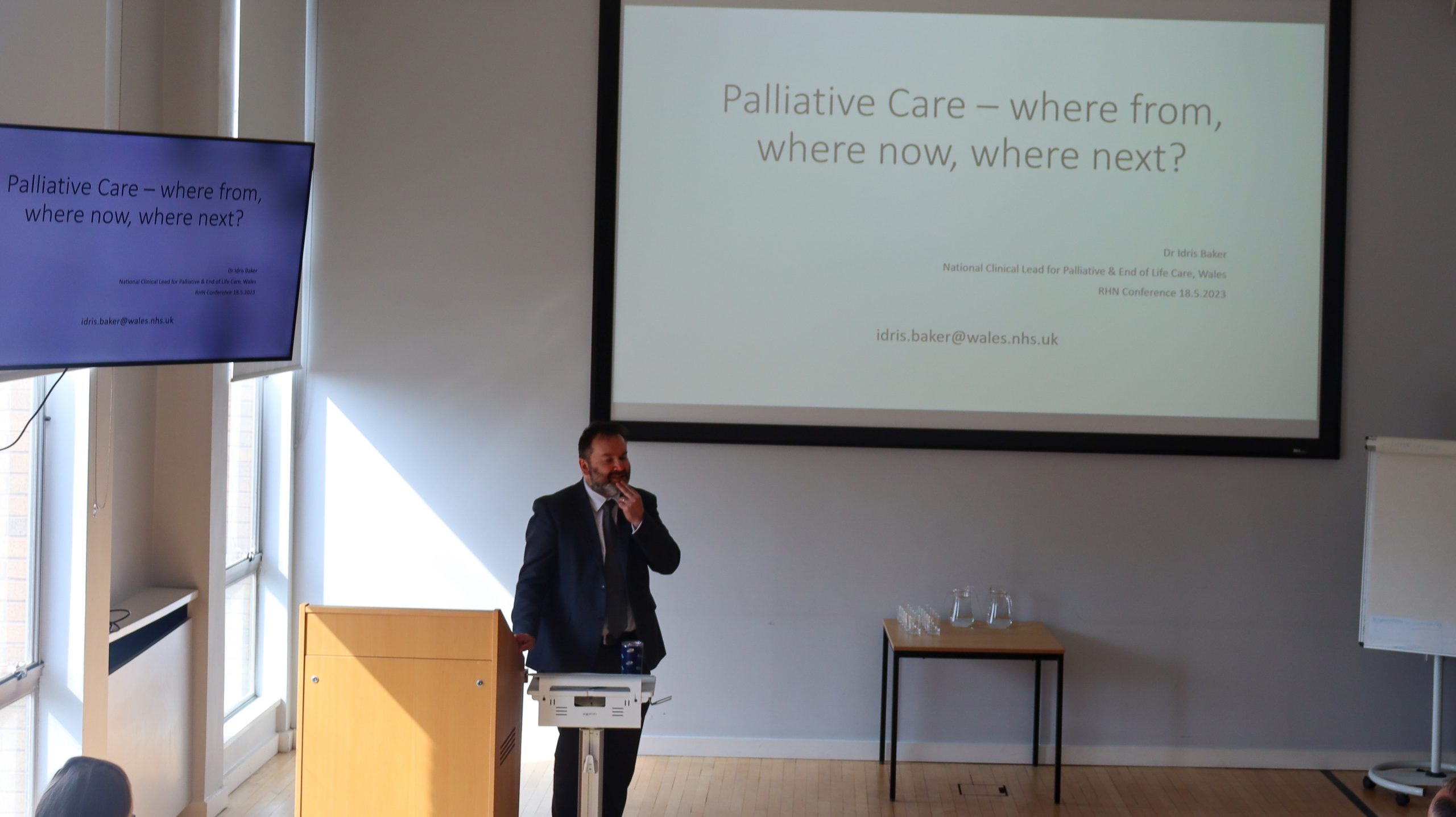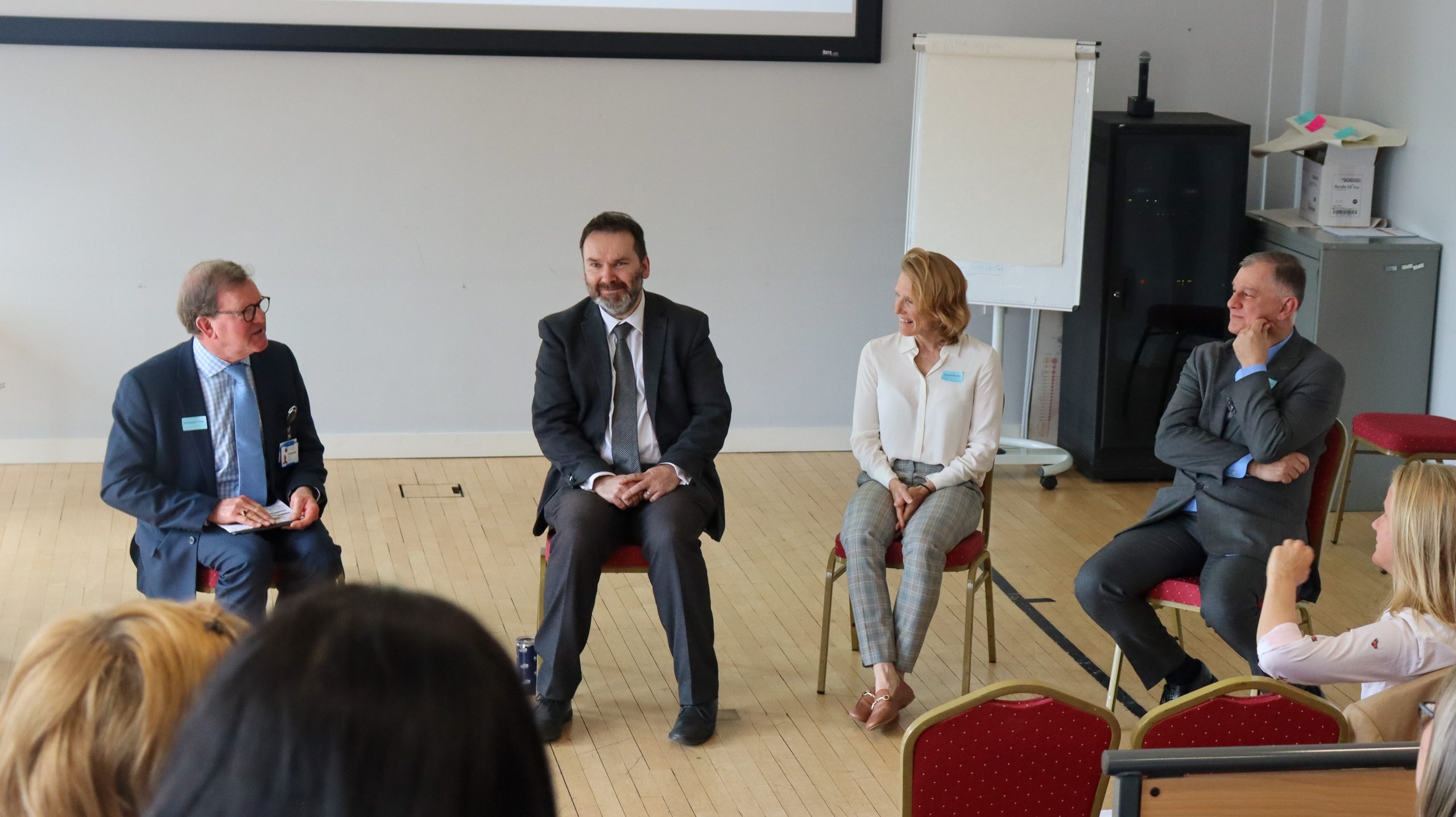Neuropalliation and End of Life Care: RHN’s first Conference since 2019
Neuropalliation and End of Life Care: RHN’s first Conference since 2019
On Thursday 18 May 2023, the Royal Hospital for Neuro-disability (RHN) held its first conference since before the COVID-19 pandemic. This was organised by Consultants Dr Andrew Hanrahan and Dr Amy Kingston, who also works at Royal Trinity Hospice in Clapham and supported by the a dedicated team at the RHN including Dr Sophie Duport and Anna Harlow. The ‘Neuropalliation and End of Life Care’ Conference covered the clinical, ethical, legal and pastoral issues relevant to excellent care. The conference was attended by many delegates and speakers who are experts in the field of Neuropalliation and End of life care.
The conference began with an opening keynote by Dr Idris Baker, Consultant in Palliative Medicine and the National Clinical Lead for Palliative and End of Life Care in Wales. He covered the current standpoint at a national level, the progress that has been made over the years, and what more needs to be done in the future. He emphasised the importance of helping patients and family members to understand what was coming.
Most people would need palliative care at some point in their lives, and they do not have to be ‘dying’ to receive it. It needs to be equitable and accessible for all, regardless of diagnosis or background. Dr Baker likened it to baking, saying that we needed to follow a recipe; however, this may not always work. Each ‘recipe’ has to be individual to the person/family to ensure they are receiving the care and support they require for their own unique needs.

Dr Andrew Hanrahan, Consultant and Clinical Lead in Neuropalliation at the RHN, reiterated many of Dr Baker’s points. In his presentation on ‘Clinical Aspects of Neuropalliation at the Royal Hospital for Neuro-disability’, he agreed that the needs of the individual should decide where a person goes to receive palliative care rather than their diagnosis.
‘Frailty does not remove an identity’
Many of the patients and residents at the RHN are in a state that would be considered ‘frail’, meaning there is a loss of physiological and cognitive reserves. They may not necessarily be at the end of their lives and have a lot of living yet to live! Addressing their often complex and severe needs would ensure this, through good communication and advance care planning.
Only the minority of residents who are currently at the RHN have the capacity to consent to their placement, meaning establishing what actions would be in their best interest can often be tricky, relying on information from people who were closest to them prior to their brain injury. Despite this, it is important that patients continue to be seen as persons with unique needs reflected in an individual care plan, regardless of diagnosis. He underlined this with the statement ‘biology must inform biography, but not write the story’. This is important to consider in ‘rehabilitative palliative care’, which means helping a person to live fully, even while dying.
Ms Rachael Marsden is a MND Nurse Consultant and Care Co-Ordinator at Oxford MND Centre. She fully agreed that individualised treatment of patient’s is absolutely vital to providing them with excellent end of life care.
The singular question that should be asked of anyone receiving this model of care is ‘What is important to you?’ For many people, it is not engaging in classic rehabilitation and goal setting but going fishing, meeting friends outdoors or going to a roaring football match. For one music teacher it was being able to see her pupils play.
Keeping a value-based, person-centred approach to care at the end of their lives provides them with dignity in their final weeks, months or years.
Dr Baker, Dr Hanrahan, and Ms Marsden then formed a live Q&A panel to give attendees the opportunity to ask questions. The panel focused mainly on advance care planning and being aware that although patients may have shared their wishes, these are subject to change depending on circumstances and should be honoured in the best way possible. For example, someone who originally said that they would like to stay at home and not go into hospice care changed their mind as their condition worsened and circumstances changed.

The afternoon portion of the conference focused on the legal considerations, person-centred decision making and dealing with grief and loss.
Mr Alex Ruck-Keen KC gave an overview of the law and policy surrounding mental capacity as relevant to neuropalliation and end of life care. He included many examples of how the law is applied to individual circumstances and the potential complications surrounding them.
RHN Consultant Clinical Neuropsychologist, Dr Sarah Crawford and RHN Clinical Lead Speech and Language Therapist Ms Erin Probert discussed ‘Person-Centred Decision Making to Promote Quality of Life in Neuropalliative Care’ that evaluated the balance of risk and best interest decisions.
‘What good is it making someone safer if it merely makes them miserable?’
Erin Probert emphasised that it is important to keep in mind what is important to a patient compared to what staff think is the best course of action. She gave an example of a woman who was struggling with high-risk eating and drinking. However, she had capacity to make her own informed decisions and wanted to continue to eat a regular diet. In this scenario, it was important to protect her choice whilst also protecting staff. Ultimately, the team came to a compromise where the patient in question would be supervised at all meal times, and she also agreed to have her food cut into smaller pieces.
It is important not to lose sight of respecting what somebody would choose, regardless of a personal opinion as a healthcare professional. This is why it is so important to have an understanding and make an effort to know who the person is and what they would want.
Equally, it is important that staff are also protected and looked after when it comes to their roles in patients’ lives. An important part of neuropalliative and end of life care is supporting families through their grief, however it is also necessary to acknowledge that staff can also experience grief when they lose a patient who they have worked with for a long time.
RHN Matron Sandy Gill shared how the phrases ‘family like’ or ‘extended family’ is often used by RHN staff to describe their relationships with patients for whom they care. For this reason, it is not uncommon for care staff to view the loss of a patient similarly to the loss of a loved one.
The ways in which staff manage their grief reactions can have an overall impact on delivery of quality care, and it is therefore essential to ensure they are supported to deal with and process difficult emotions around grief and loss. Self-control and suppression of feelings is not healthy or productive to the care of residents. The RHN has been continuously evolving and improving ways in which they are able to support staff, such as debriefing after a death, education and training as well as learning from family feedback.
Whilst staff experience the grief of losing a person they did not know before the injury, their family often have the difficult and unique experience of a double bereavement. A second loss after having got used to the changed identity and loss of the person they knew.
We also heard from Former GP and Associate Professor of Bioethics and Medical Law, Dr Trevor Stammers, who shared some of his personal reflections from general practice and family life in dealing with dilemmas around dying. He shared multiple stories from his career as a GP, and how family dynamics can impact the way that end of life care is approached depending on the individual.
Pastor Geoff Coyne, who has worked at the RHN for over 20 years, spoke about the concept of ‘ambiguous loss’, which often happens for families who have loved ones admitted to the RHN. Although their family member is still alive and present in the physical world, essential parts of their identity are lost or changed forever, without closure or a funeral. This brings about an ‘infinite grieving cycle’. Many families describe their experience as losing a person who has ‘said goodbye without leaving’. The loss is present day-in and day-out, sometimes for many years.
The presentation included a video of a family member who had recently lost her sister, a former resident at the RHN. She described feeling that when her sister initially suffered her brain injury, it was as if she has been ‘abducted’ and replaced by a complete stranger. This initial grieving process lasted years as the family had to get to know and love this ‘new person’.
When her sister died, the family entered into a new period of grieving, where they grieved for the new person they had come to know, and had now lost. Many families at the RHN describe the ways in which they have experienced grief for years before closure. This is why it is so important to have adequate support in place for families.
Being able to support people through their grief whilst also providing excellent neuropalliative and end of life care to their loved ones is an important aspect of the work we do. As we learnt at the Conference, there are many elements and layers to providing this type of care in the best way possible, and the way it is delivered is ever evolving.